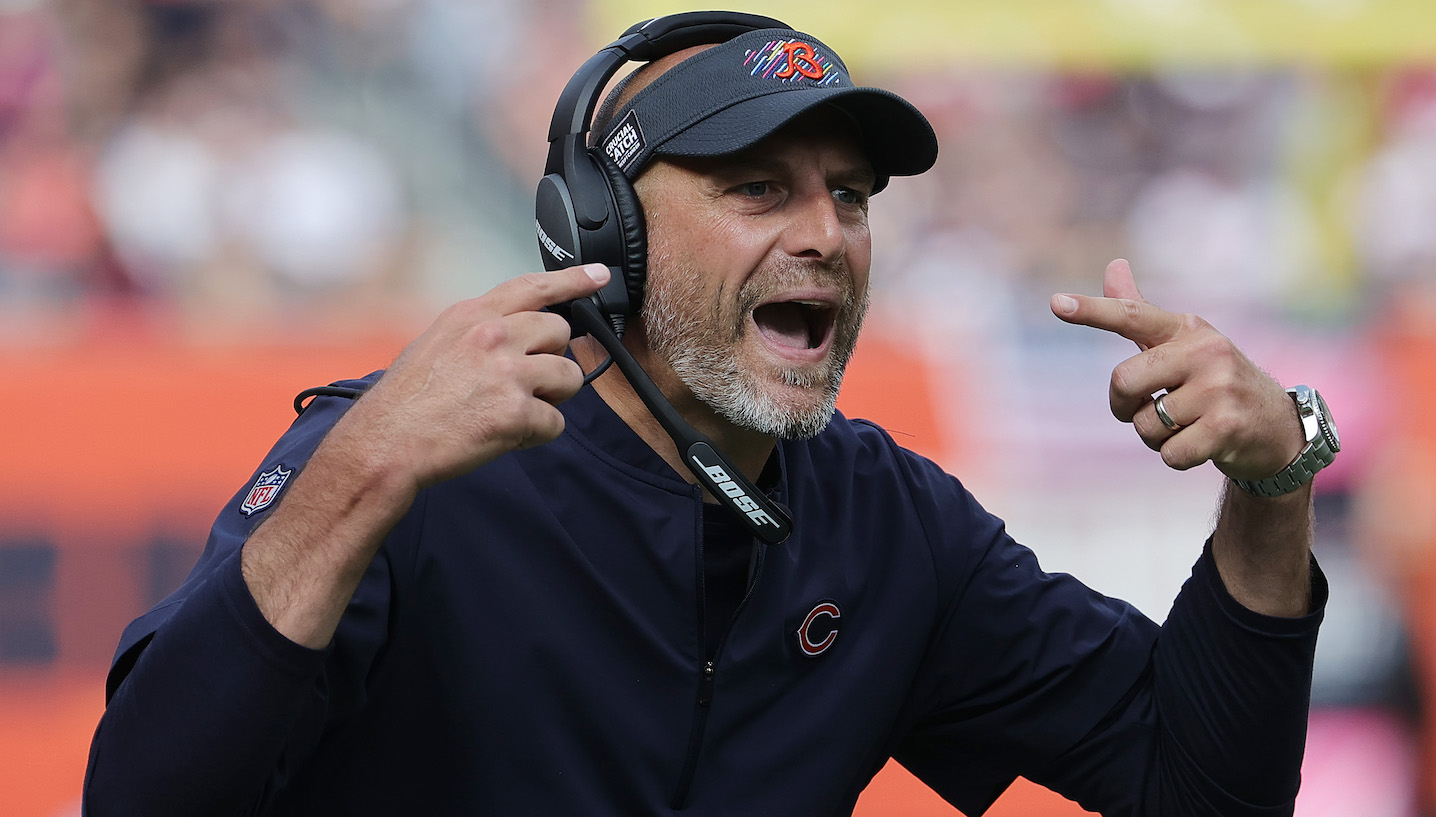Matt Nagy had no intention of revealing who called the plays Sunday in the Bears' 24-14 win over the Detroit Lions, but it was obvious that this wasn’t his work. The Bears scored a touchdown on their first drive, a sign that someone else was clearly directing the flow of this game.
Nagy’s version of the offense last week in Cleveland broke down completely. In a 26-6 loss to the Browns, the Bears managed a total of just six first downs, 46 rushing yards, and one net passing yard. Rookie quarterback Justin Fields completed 6-of-20 passes for 68 yards, but was sacked nine times for a total loss of 67 yards. The Bears ran the ball 13 times.
Yesterday was a completely different story. The Bears' first drive of the game totaled 75 yards and resulted in a touchdown run by David Montgomery. Already the team had eclipsed its previous performance. On the next drive, Fields found receiver Darnell Mooney, quickly becoming his favorite target, for 64 yards downfield. It was a deep bomb that wasn't at all a staple of the Nagy style.
Fields threw for 209 yards and completed 11-of-17 passes with one interception, as the Bears beat Detroit. It should be noted that the Lions are winless and have nothing that resembles a pass rush, but still: An offense that was historically bad the previous week was now flowing! It had real direction. Before a late knee injury, Montgomery took 23 carries for 107 yards and two TDs, and the Bears finished with 188 rushing yards. A balanced attack? Chicago hardly knows her.
Nagy was evasive all week when asked about who would be calling plays. “Probably the best part of the last 48 to 72 hours is we’ve had some amazing, healthy conversations between coaches and coaches, between coaches and players, players and players, players and coaches,” Nagy said, when asked if he would remain the play caller. “That’s what I appreciate most and so without getting into specifics of what we’re gonna do and how we’re gonna do it with—not just that stuff but other topics—I’m gonna keep that internal and I think that’s the best part right now for us.”
Last season, Nagy turned over the task to offensive coordinator Bill Lazor in Week 10. It took a few weeks for the Bears' offense to improve, but eventually it did. With Lazor as the publicly credited play-caller in 2020, the offense averaged 335.1 yards per game and 25.4 points per game in eight games, whereas in Nagy’s nine games of 2020, the offense averaged 317.8 yards and 19.8 points.
Nagy seemed to want to avoid the question for as long as possible in an effort to maintain his reputation as an offensive guru. There is hardly a competitive advantage to be gained by withholding that information, and anyway it becomes clear when Nagy isn’t spending as much time glancing at his playsheet. Most teams are up front about who is calling plays and who isn’t, because it’s not easy to obscure once the season starts. But this was Nagy’s full answer to the first postgame question about whether or not he had delegated play-calling against the Lions:
Yeah, again, that goes back to what we talked about internally for the whole week is whatever I can do, the best thing for the Bears, whatever that is, and I think that again, for us, I think big-picture, so we all understand it, is the offense in general, we get together on Monday as a staff, Monday, Tuesday, Wednesday, Thursday, Friday, we go through everything together. Ultimately it goes through me, everything that we do, regardless of anything else, who's calling this, who's calling that, it goes through me. That part I appreciate because we do it together, and then there's a collaboration of how we do it. But I thought that our coaches did a great job today. I thought our players executed, which is what we asked for, and quite honestly, again, like I know—with all due respect, I understand the questions, but that's what it is, and that's what it's going to be the rest of the year is just knowing that whatever happens, it goes through me, and we've done it together.
OK, then. Those words tell us mostly that Nagy is doing a lot of work to dodge this question altogether, and he’ll do whatever he can do for the offense, “the best thing for the Bears, whatever that is.” Also, the staff works five days a week on collaborating.
Six questions later, Chicago Sun-Times reporter Mark Potash cornered Nagy with a followup. He’s good at doing that.
“Just to clarify, can you say who called the plays, and if there was a chance, what impact it had on the game?” Potash asked.
“Yeah, so in regards to the play-calling, Bill did a great job,” Nagy said. The coach finally admitted that the work was not his own, but continued to talk more about how everyone is involved in the game plan, and how every decision runs through him because he's the head coach. “So we'll continue to just keep talking. We'll continue to—but again, with all due respect, all due respect, this is going to be the last time I talk about it.”
Yes, Nagy chose to veto the entire topic, because it very clearly does not make him look good. But the Bears beat is one of the more aggressive beats in the league. Bless them because the next question, from a different reporter, was: "Do you intend to stick with Bill as the play caller?"
Nagy laughed and shook his head, exasperated. “Like I said—you're unbelievable. You try—listen, I hope you understand, I get it. I get it. I get it. But just know, like that's it. No more with this.”
I have faith that Bears beat writers will continue to ignore this edict.






